

7 Essential Insights on Pet ESA for Mental Health Support
by Lena Park
Last updated: July 12, 2025
Verified and Approved by:
Angela Morris,
MSW, LCSW
Fact Checked

Overview
This article offers vital insights into the emotional support that animals (ESAs) can provide for those facing mental health challenges. Many individuals struggle with feelings of isolation and anxiety, and it’s important to recognize the profound impact these emotions can have on daily life. ESAs play a crucial role in enhancing emotional well-being by offering companionship and comfort, helping to alleviate some of the burdens that come with mental health issues.
Understanding the legal distinctions surrounding ESAs is essential for those seeking support. The Fair Housing Act and the Air Carrier Access Act provide important protections, ensuring that individuals can access housing and travel with their beloved support animals. This knowledge can empower individuals to advocate for themselves and their needs, fostering a sense of security and belonging.
If you’re feeling overwhelmed, know that you are not alone. The process of obtaining an ESA letter can be a supportive step toward improving your emotional health. It’s a compassionate solution that opens doors to the companionship of an animal who can provide comfort during difficult times. Remember, help is available, and taking this step can lead to a brighter, more connected future.
Introduction
In today’s world, many individuals find themselves navigating a complex emotional landscape filled with challenges. This often leaves them yearning for solace and support. Emotional Support Animals (ESAs) have emerged as vital companions, offering not just comfort but also a profound sense of companionship to those grappling with mental health issues.
This article explores seven essential insights about ESAs, shedding light on their significant benefits, the legal distinctions from service animals, and the steps necessary to obtain an ESA letter. As the need for emotional support continues to grow, understanding these aspects becomes crucial.
What are the real advantages of having an ESA? How can one effectively navigate the complexities of acquiring the necessary documentation? Together, we will explore these important questions, fostering a deeper understanding of the support available.
Wellness Wag: Streamlined ESA Letter Services for Quick Approval
At Wellness Wag, we understand the emotional challenges that many individuals face when dealing with mental health issues. The journey can often feel overwhelming, and that’s where we come in. Our streamlined platform is designed to simplify the acquisition of pet ESA letters, providing you with the support you need.
The process begins with a brief evaluation to determine your eligibility, allowing us to tailor our services to your specific emotional assistance needs. After this initial step, we connect you with licensed medical professionals for personalized consultations. Once authorized, you can typically receive your official ESA letter within just 24 hours. This rapid turnaround is essential for those experiencing urgent mental health challenges, enabling you to secure housing and travel accommodations without delay.
Experts highlight that timely access to ESA letters can significantly reduce stress and improve overall well-being. This makes our service a vital resource for those in need of emotional support. We also recognize that accessibility is important, which is why Wellness Wag offers flexible payment plans starting at just $32.25.
We invite you to start your assessment today and take the first step towards receiving your pet ESA letter quickly. Visit the Wellness Wag website and let us support you on your journey to improved emotional well-being.
Service Animals vs. Emotional Support Animals: Key Legal Differences
Service creatures are specifically trained to perform tasks for individuals with disabilities and are protected under the Americans with Disabilities Act (ADA). In contrast, pet esa offer comfort and companionship but do not require specialized training. While service animals enjoy greater access rights in public areas, such as restaurants, stores, libraries, and public transport, emotional support animals are mainly safeguarded under the Fair Housing Act (FHA) and the Air Carrier Access Act (ACAA). These regulations allow pet esa to accompany their owners in housing situations and during air travel, ensuring that individuals facing mental health challenges can maintain their essential emotional support.
It’s important to note that there is no legal requirement for service dogs to be certified or registered. However, obtaining certification from recognized organizations can lend credibility and ensure that the service dog has received proper training. This certification supports the rights of service dog owners under the ADA, allowing them full public access. Recent legal developments underscore the significance of understanding these distinctions. For instance, the FHA mandates reasonable adjustments for emotional support animals, which may include exceptions to ‘no pet’ rules in housing. Legal cases have emerged that reinforce these rights, emphasizing the necessity for landlords to accept valid documentation for pet esa. As awareness of emotional support ownership and legal protections grows, advocates stress the importance of recognizing the distinct roles that both assistance animals and pet esa play in supporting individuals with disabilities.
Disability rights advocates highlight that while service animals are trained to perform specific tasks, pet esa provide vital assistance that is increasingly recognized as essential for mental well-being. This growing acknowledgment is reflected in the rising number of registered emotional support animals, which approached nearly 200,000 in 2019. This statistic underscores the ongoing need for advocacy and education regarding the legal rights of their owners.
As you reflect on your own experiences, consider how a pet esa could enhance your life by providing comfort and companionship during challenging times. The journey toward understanding and obtaining a pet esa letter can be a supportive solution, offering you the reassurance and emotional connection you deserve.
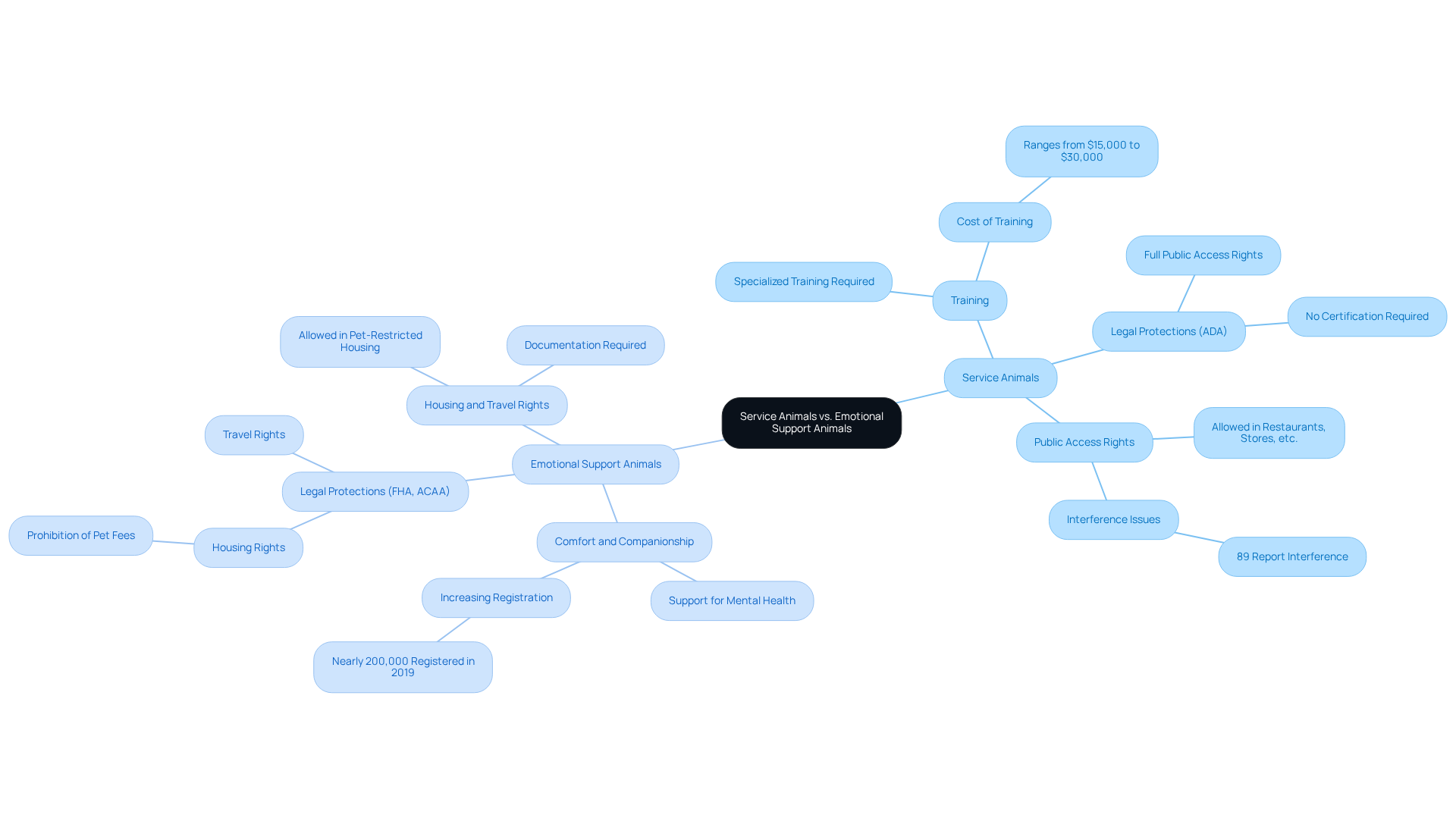
Mental Health Benefits of Emotional Support Animals: Enhancing Wellbeing
Pet ESAs play a vital role in easing the burdens of anxiety, depression, and PTSD. Many individuals face overwhelming emotional challenges, and research shows that the presence of an ESA can significantly lower blood pressure, reduce stress levels, and enhance overall emotional stability. The unconditional love and companionship offered by these creatures nurture a profound sense of security and belonging, which is especially beneficial for those grappling with mental health difficulties. This emotional connection not only fosters improved daily functioning but also instills a greater sense of purpose in their lives.
Have you ever felt isolated in your struggles? Studies reveal that 73% of pet ESA owners rate the effectiveness of their pet ESA in improving mental health at eight or higher on a scale of ten. This statistic underscores the positive impact these animals have on emotional well-being. Furthermore, qualitative feedback from participants highlights notable decreases in anxiety, depression, and loneliness after welcoming a pet ESA into their lives. This emphasizes the crucial role these companions play in mental health recovery.
As Janet Hoy-Gerlach notes, the importance of pet ESA in promoting mental health recovery is gaining recognition worldwide, showcasing their significance in therapeutic settings. The GRR Method also advocates for integrating companion animals into coping strategies, illustrating how pet ESA can be woven into mental health recovery frameworks.
Legal protections under the Fair Housing Act and the Air Carrier Access Act reinforce the importance of obtaining pet ESA letters, ensuring individuals can access the support they need. At Wellness Wag, we understand the challenges you face, and we offer a streamlined process for acquiring authentic pet ESA letters. Our goal is to help you obtain the assistance you require efficiently. Our clients have shared heartwarming testimonials about their experiences, emphasizing how our services have made a meaningful difference in their lives.
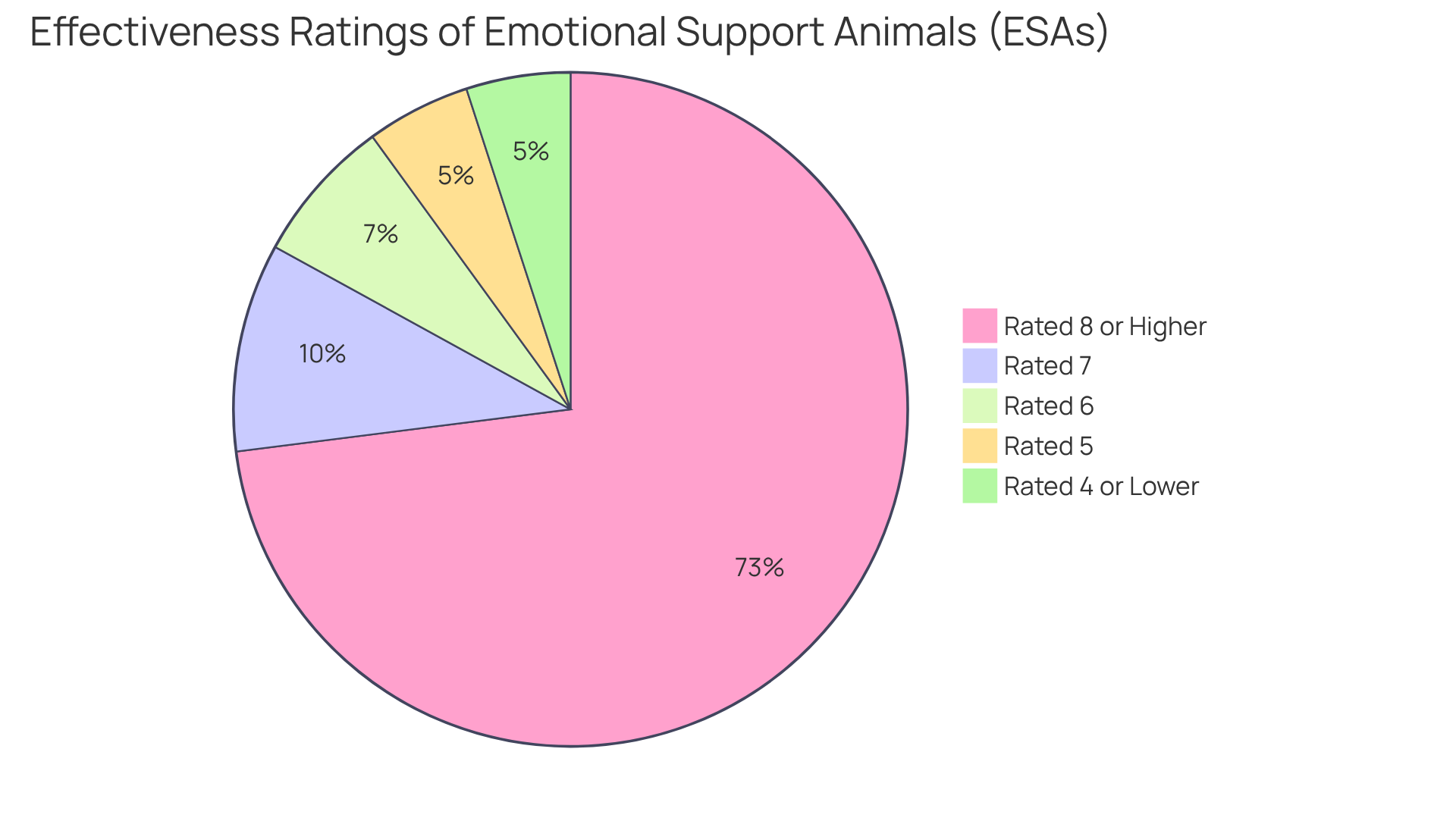
How to Obtain an ESA Letter: Step-by-Step Guide
Obtaining an ESA letter can be a vital step toward enhancing your emotional well-being. Many individuals face challenges such as anxiety, depression, or PTSD, which can feel overwhelming. Recognizing these struggles is the first step in finding comfort and support through a pet esa.
To begin this journey, it’s essential to assess your needs. Ask yourself if you have a qualifying mental health condition that could benefit from the companionship of a pet esa. Once you’ve reflected on this, the next step is to consult a licensed mental health professional (LMHP). Scheduling an appointment allows you to discuss your specific needs and explore whether an ESA is the right choice for you.
During your consultation, it’s important to openly share your mental health challenges. This dialogue is crucial for the professional to fully understand your situation and how a pet esa can help alleviate your symptoms. If the professional determines that a pet esa is appropriate, they will issue a valid ESA letter, typically within 24 hours. This letter can be instrumental in securing housing and travel accommodations, so ensure it includes all necessary details, such as the professional’s information and a clear recommendation for the ESA.
Moreover, maintaining regular check-ins with your pet esa is highly recommended for mental well-being. These follow-ups provide ongoing support and allow for adjustments to your mental health needs as they evolve. This proactive approach not only helps in renewing your ESA letter when necessary but also fosters a deeper connection with your mental health journey.
It’s also worth noting that pet esa are permitted in university accommodations, which can be particularly beneficial for working professionals in educational settings. Familiarizing yourself with the Fair Housing Act and Air Travel Regulations for emotional support animals is essential, as these laws outline your rights and guidelines for housing and travel.
Remember, you are not alone in this journey. Support is available, and taking these steps can lead you to a more fulfilling and emotionally secure life.
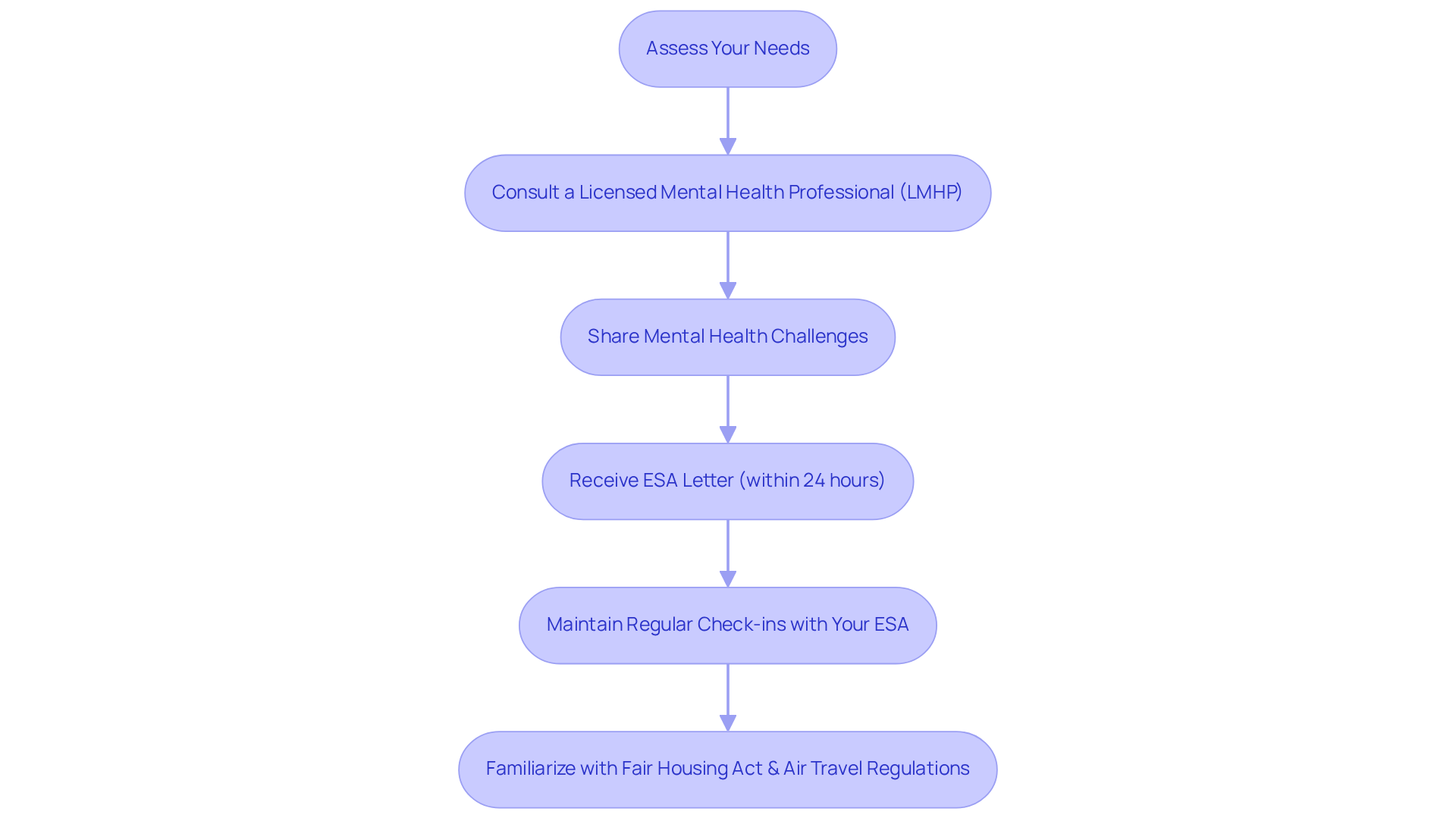
Housing Rights for ESA Owners: Understanding the Fair Housing Act
Under the Fair Housing Act (FHA), individuals with pet ESA are entitled to reasonable accommodations in housing, even in properties that enforce no-pets policies. This means that landlords cannot impose extra fees or deposits for pet ESA, and they must allow tenants to live with their companion pets. To validate their request for accommodation, tenants need to present a valid letter for their pet ESA from a licensed mental health professional. This important letter confirms the necessity of the ESA for the tenant’s mental health needs.
Understanding these rights is crucial for owners of pet ESA as they navigate housing situations, helping them avoid discrimination and find the support they deserve. It’s heartening to see that compliance among landlords is improving, with many now accommodating requests for pet ESA. Advocacy groups stress the importance of clear communication between tenants and landlords, fostering understanding and compliance with the FHA. Successful accommodation requests often involve tenants proactively informing landlords about their rights under the FHA and providing the necessary documentation for pet ESA.
As awareness of the legal protections for pet ESA continues to grow, it becomes vital for individuals to stay informed about their rights and the processes involved in securing housing accommodations. This knowledge not only empowers those who have a pet ESA but also fosters a more encouraging atmosphere for individuals relying on emotional assistance creatures for their mental well-being. Remember, you are not alone in this journey; support is available, and understanding your rights can make a significant difference.
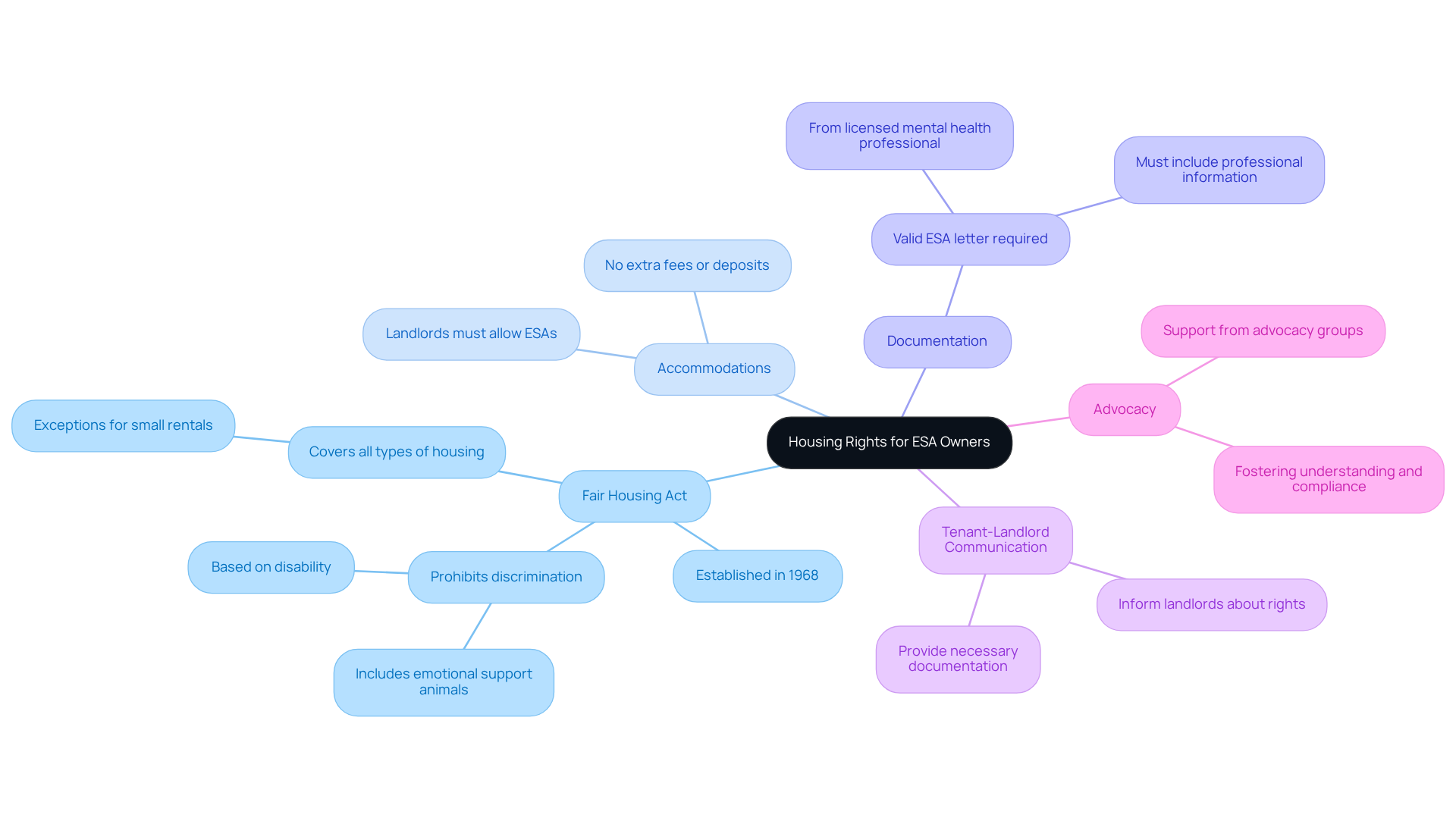
Traveling with ESAs: Air Carrier Access Act Guidelines
The Air Carrier Access Act (ACAA) has historically allowed individuals with pet ESA to travel with their beloved animals in the cabin of an aircraft. However, recent regulatory changes have significantly altered this landscape. Many airlines no longer recognize ESAs as pet ESA, which can lead to ESA owners facing unexpected pet fees and additional carrier requirements. This shift can understandably cause concern for those who rely on their emotional companions for support.
It is essential for owners of pet ESA to check their airline’s specific policies regarding travel with emotional support animals. Understanding the documentation requirements and any associated fees is crucial for a smoother travel experience. By preparing adequately and familiarizing themselves with these changes, owners of a pet ESA can ensure a more pleasant journey for both themselves and their cherished companions.
With approximately 18% of pet owners in the U.S. having emotional support animals, the need for clarity in airline regulations is increasingly urgent. As awareness of the mental health benefits of these companions continues to grow, it is vital to navigate these new challenges with compassion and understanding.
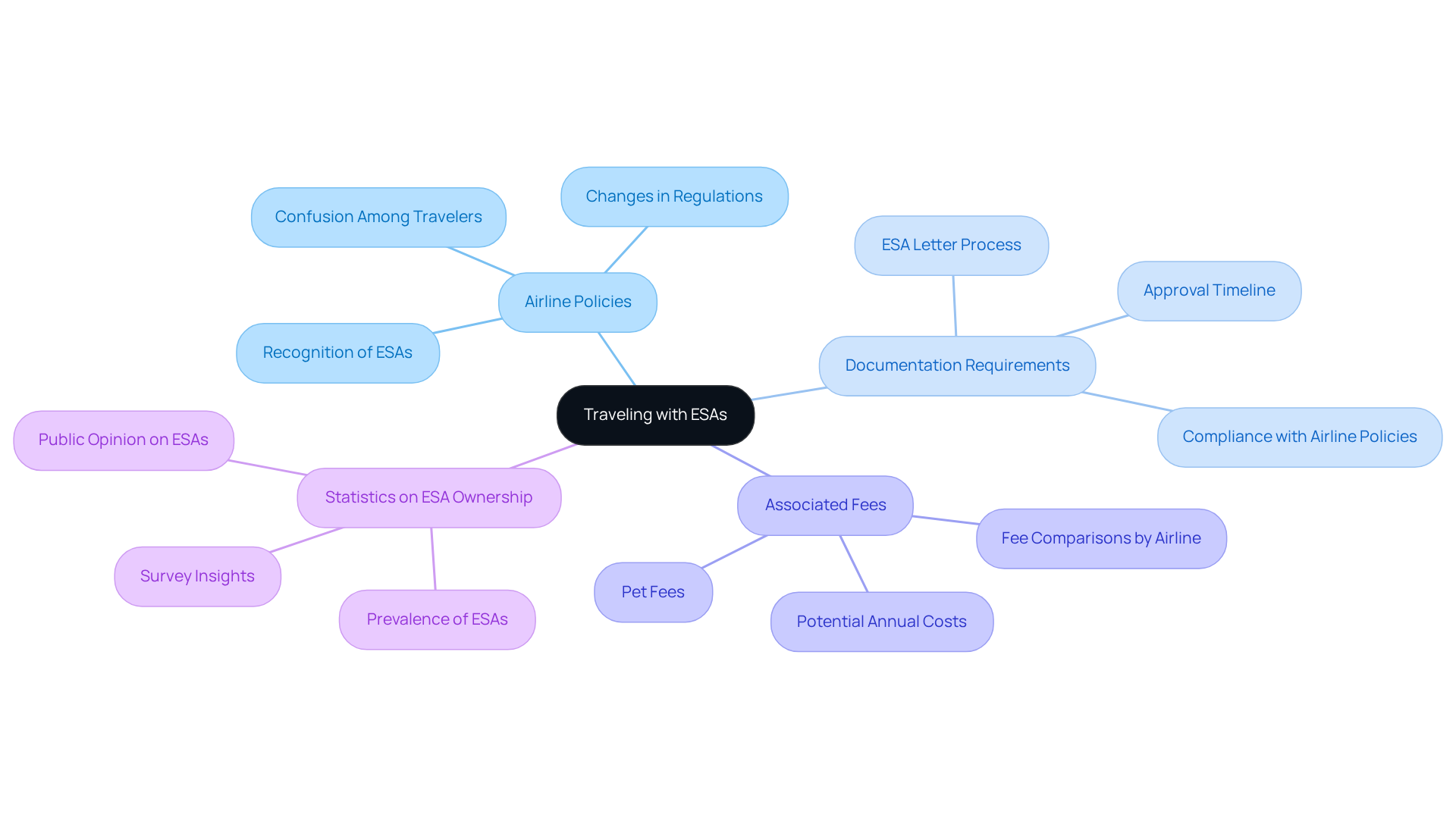
Common Myths About Emotional Support Animals: Debunking Misconceptions
Many individuals face emotional challenges that can feel overwhelming, and it’s important to clarify some common misconceptions about pet esa that may add to this confusion.
-
Myth: Emotional support animals require special training.
Fact: Unlike service animals, pet esa do not need specialized training; their primary role is to provide comfort and companionship to their owners. -
Myth: Emotional support animals can go anywhere.
Fact: While pet esa offer significant emotional benefits, they do not have the same public access rights as service animals. They are mainly protected under housing and travel regulations, such as the Fair Housing Act (FHA), which ensures reasonable accommodations. -
Myth: You can register your ESA online.
Fact: There is no official registry for emotional support animals. Instead, a valid letter from a licensed mental health professional is all that is needed to recognize their importance. -
Myth: All pets can be emotional support animals.
Fact: Although various types of creatures can serve as pet esa, they must be controllable and genuinely provide emotional assistance to their owners.
Understanding these truths can help ease the emotional burden many face, and knowing that support is available can be a comforting thought.
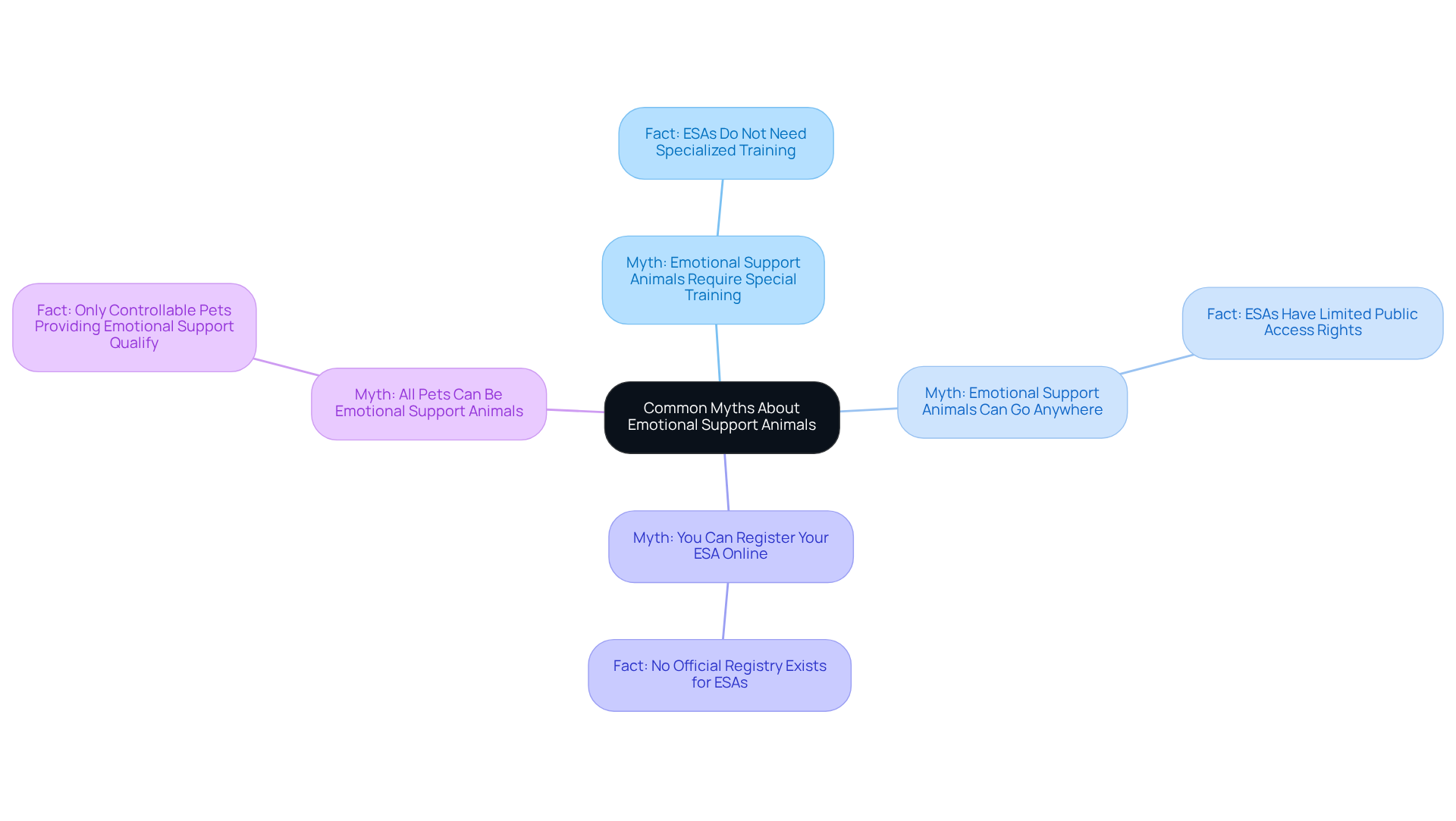
Types of Animals Eligible as Emotional Support Animals: What You Need to Know
Emotional assistance creatures encompass a diverse array of domesticated types, including pet esa such as dogs, cats, rabbits, birds, and even miniature pigs. While dogs and cats remain the most common choices, the eligibility criteria for pet esa allow for a broader spectrum of creatures, provided they offer comfort and emotional support to their owners. The essential requirement is that the creature must be manageable in public settings and not cause disturbances. This flexibility empowers individuals to choose a pet esa that aligns with their unique lifestyle and emotional needs.
As we look ahead to 2025, the landscape of emotional support animals, particularly pet esa, continues to evolve, with various species recognized for their therapeutic benefits. For example, rabbits are increasingly celebrated for their calming presence, while birds can enhance social interactions and provide companionship. Additionally, unconventional emotional support animals, such as miniature pigs, have gained popularity as a pet esa due to their affectionate nature and strong bonds with their owners.
Statistics indicate that approximately 78% of ESAs in the U.S. are dogs, with cats accounting for about 21%. Other species, including rabbits and birds, contribute to the growing variety of emotional assistance creatures. Veterinarians emphasize that the suitability of a pet esa depends on the individual’s needs and the creature’s temperament, highlighting the importance of selecting a pet esa that fosters a positive emotional connection.
At Wellness Wag, we deeply understand the significance of emotional companions, such as pet esa, in enhancing mental well-being and providing housing opportunities for individuals, including students. Our streamlined process for obtaining ESA letters ensures that clients receive the necessary documentation to support their needs. Testimonials from satisfied clients reflect the simplicity and effectiveness of our services, reinforcing our commitment to helping individuals navigate the requirements for emotional assistance creatures.
Ultimately, the criteria for choosing a pet esa should focus on its ability to provide comfort, companionship, and emotional stability, ensuring it meets the specific needs of its owner. It is advisable for individuals to consult with licensed professionals to guide them in selecting the most appropriate ESA. Furthermore, all service creatures must be harnessed, leashed, or tethered unless these measures interfere with their work, or the student’s disability prevents the use of such devices. Students with service pets are required to register with the Disability Access Office (DAO) and complete a service pet agreement form, which includes submitting vaccination records and a photo of the pet.
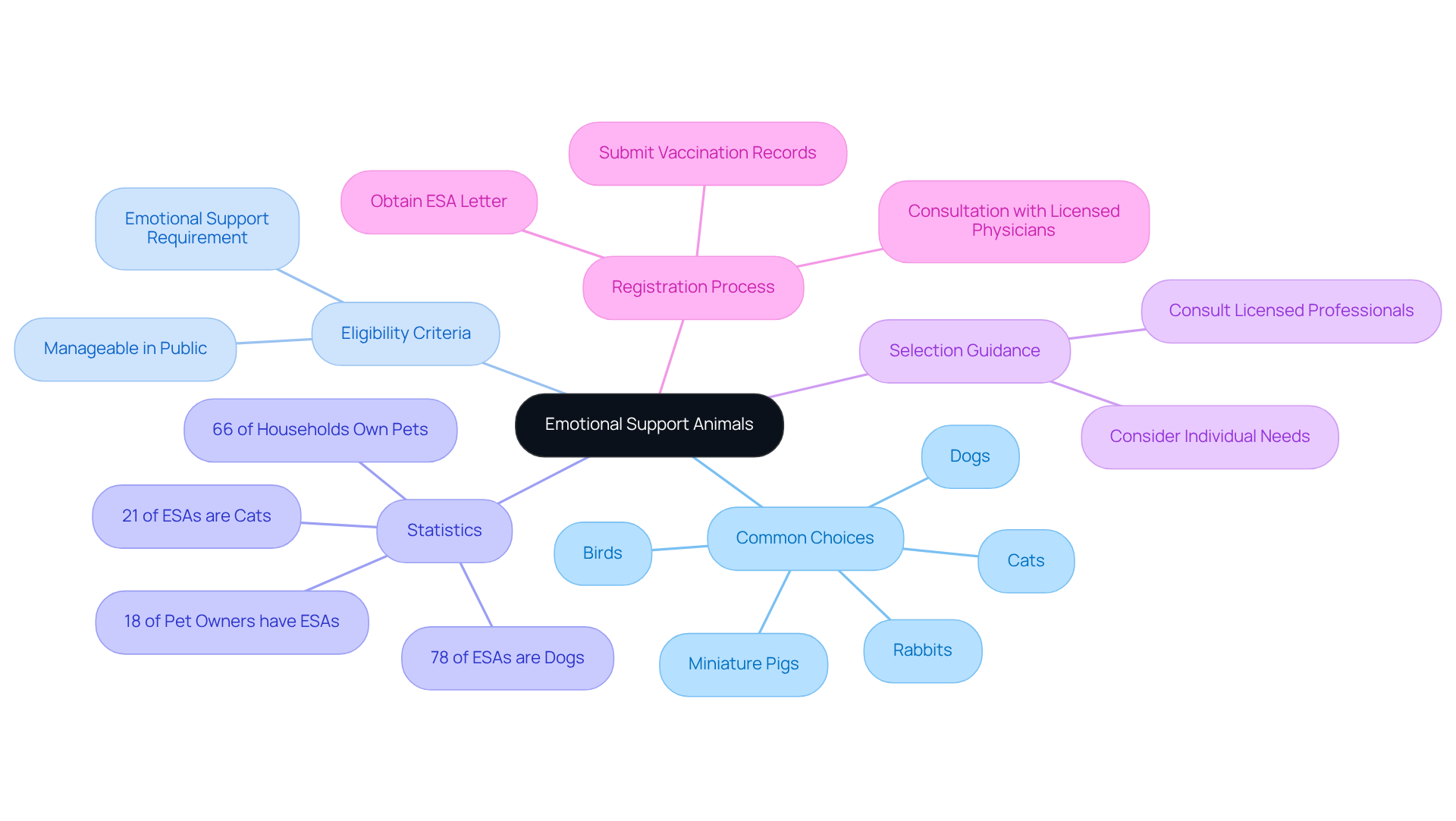
The Importance of Pet Insurance for ESA Owners: Financial Protection
For owners of emotional support animals (ESAs), having pet ESA insurance is an essential lifeline, providing a safety net against unexpected veterinary expenses. As the costs of pet care continue to climb—averaging around $1,391 annually for dogs and $1,149 for cats—the financial strain can be overwhelming.
It’s heartening to note that 57% of pet owners with insurance find ‘peace of mind’ to be their main motivation for securing a policy. Many pet insurance plans encompass accidents, illnesses, and routine care, enabling owners of pet ESA to focus on their beloved pets’ wellbeing without the shadow of financial worries.
It’s vital for owners of pet ESA to take the time to research and compare various pet insurance options, ensuring they find a plan that truly meets their unique needs. Starting this journey can be as simple as visiting comparison websites, reading reviews, and engaging with fellow pet owners to make informed, nurturing choices.
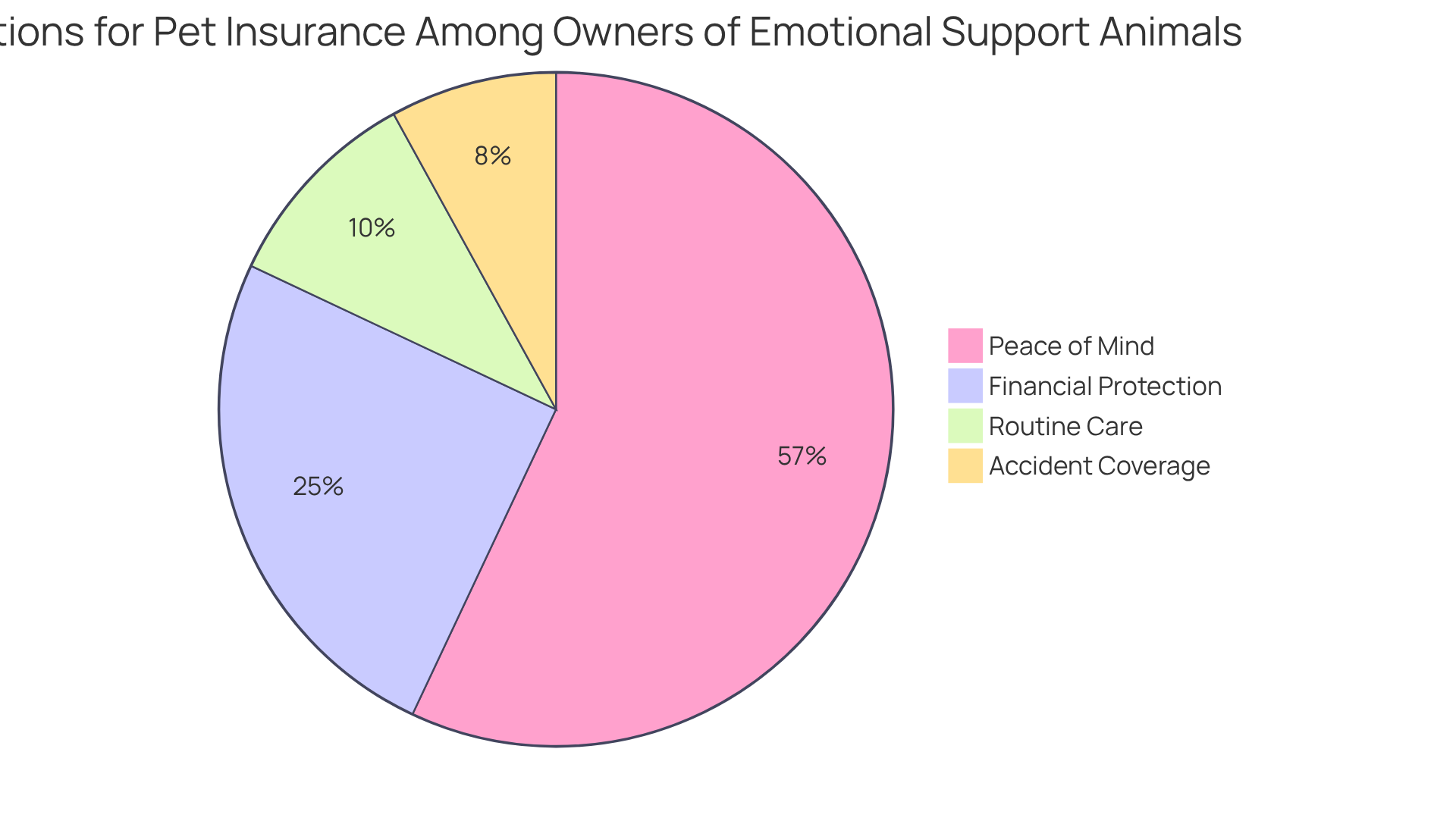
Role of Licensed Professionals in ESA Certification: Ensuring Validity
Licensed mental health experts play a vital role in the certification process for pet ESA. They understand the emotional challenges individuals face and assess their mental health needs to determine how incorporating a pet ESA can be a beneficial part of their treatment plan. A legitimate letter for a pet ESA, provided by a certified expert, outlines the person’s mental health issue and emphasizes the importance of the animal for emotional support. This thorough process ensures that ESA letters are valid and comply with legal standards, safeguarding the rights of ESA owners in housing and travel situations.
As we look ahead to 2025, the growing number of licensed professionals issuing ESA letters reflects an increasing recognition of the therapeutic benefits that animal companionship can provide. Mental health specialists emphasize that the certification process is more than just a formality; it is a crucial step in ensuring that individuals receive the support they truly need. As one expert insightfully remarked, “The integrity of the ESA certification process is crucial in offering individuals the emotional assistance they need while managing their mental health challenges.”
Wellness Wag has received numerous heartfelt testimonials from clients who have experienced a streamlined and supportive process. For example, James B. shared, “I had a great experience with Wellness Wag. The approval process for my ESA was easy and hassle-free. Five stars from me!” This sentiment resonates with many others who found the journey to be quick, efficient, and free of stress.
To ensure the validity of a pet ESA letter, it is essential for individuals to seek services from licensed professionals who understand the legal requirements surrounding pet ESAs. This approach not only enhances the credibility of the letter but also underscores the importance of professional guidance on the path to emotional well-being. Successful ESA certifications have been documented, showcasing how licensed professionals effectively match individuals with suitable emotional support animals, illustrating the positive impact of this compassionate process.
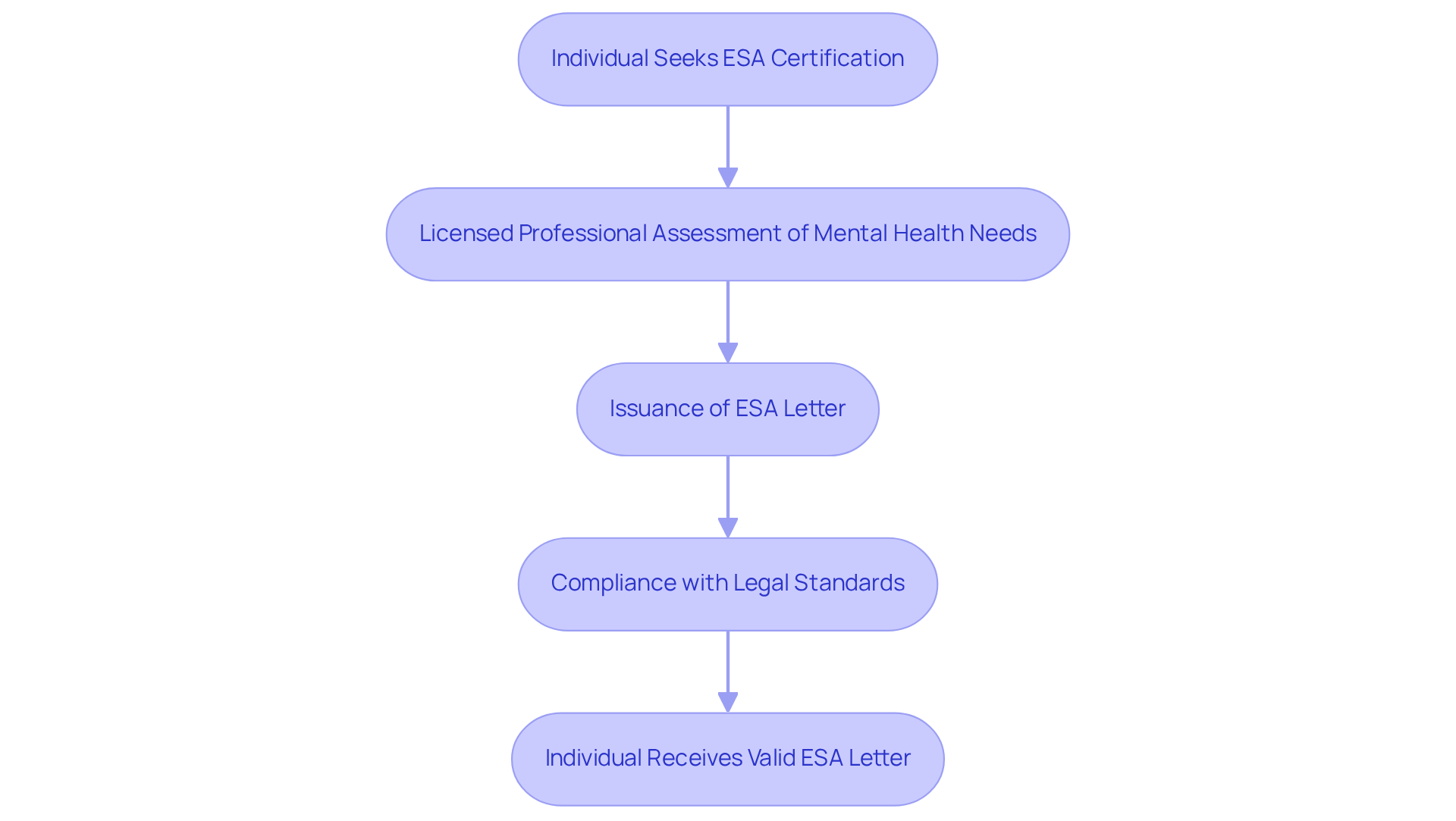
Conclusion
Emotional support animals (ESAs) are vital companions for individuals facing mental health challenges, providing comfort and companionship that can significantly enhance emotional well-being. It is crucial to obtain a legitimate ESA letter, as it allows individuals to access housing and travel accommodations while safeguarding their rights under laws such as the Fair Housing Act and the Air Carrier Access Act.
Throughout this discussion, we have uncovered key insights, including:
- the legal differences between service animals and emotional support animals
- the mental health benefits associated with ESAs
- the streamlined processes for acquiring ESA letters
Additionally, debunking common myths surrounding ESAs clarifies their role and the support they provide. It is essential to recognize the importance of licensed professionals in the certification process, ensuring that individuals receive the appropriate validation for their emotional support needs.
Ultimately, the journey toward obtaining an ESA letter transcends legal rights; it is about fostering a deeper connection with a companion that can provide emotional stability and enhance quality of life. For those considering this path, taking the first steps toward acquiring an ESA letter can be transformative, paving the way for improved mental health and a more fulfilling life. Embrace the support that an emotional assistance animal can offer, and explore the resources available to ensure that you and your companion thrive together.
Frequently Asked Questions
What is Wellness Wag and what services do they offer?
Wellness Wag is a platform that provides streamlined services for acquiring emotional support animal (ESA) letters. They simplify the process of obtaining these letters to support individuals facing emotional challenges related to mental health.
How does the process of obtaining an ESA letter work at Wellness Wag?
The process begins with a brief evaluation to determine eligibility, followed by personalized consultations with licensed medical professionals. Once authorized, individuals can typically receive their official ESA letter within 24 hours.
Why is timely access to ESA letters important?
Timely access to ESA letters can significantly reduce stress and improve overall well-being, allowing individuals to secure housing and travel accommodations without delay, especially during urgent mental health challenges.
What are the payment options available for Wellness Wag services?
Wellness Wag offers flexible payment plans starting at $32.25, making their services more accessible to individuals in need.
What is the difference between service animals and emotional support animals (ESAs)?
Service animals are specifically trained to perform tasks for individuals with disabilities and are protected under the Americans with Disabilities Act (ADA). In contrast, emotional support animals provide comfort and companionship but do not require specialized training and are primarily protected under the Fair Housing Act (FHA) and the Air Carrier Access Act (ACAA).
What legal protections do emotional support animals have?
Emotional support animals are protected under the Fair Housing Act, which allows them to accompany their owners in housing situations, and the Air Carrier Access Act, which permits them to travel with their owners on airplanes. Landlords are required to accept valid documentation for ESAs.
What are the mental health benefits of having an emotional support animal?
Emotional support animals can ease burdens of anxiety, depression, and PTSD, significantly lower blood pressure, reduce stress levels, and enhance overall emotional stability. They provide companionship that fosters a sense of security and belonging, improving daily functioning and instilling purpose in their owners’ lives.
How effective are emotional support animals in improving mental health according to studies?
Studies show that 73% of pet ESA owners rate the effectiveness of their pet in improving mental health at eight or higher on a scale of ten, highlighting their positive impact on emotional well-being.
What is the significance of obtaining a pet ESA letter?
Obtaining a pet ESA letter is crucial for ensuring access to the support needed under legal protections provided by the Fair Housing Act and the Air Carrier Access Act, allowing individuals to benefit from their emotional support animals in various situations.
Certify Your Emotional Support Animal Today

Why You Can Rely on Us?
At Wellness Wag, we believe your pet deserves care rooted in both science and compassion. Each article is carefully researched, written in clear language for pet owners, and then reviewed by qualified professionals to ensure the information is evidence-based, current, and practical for real-life care. Our goal is to help you feel confident in making informed decisions about your pet’s health and well-being.
Reviewed by
Angela Morris, MSW, LCSW
Angela is a licensed clinical social worker with 20 years of experience in patient advocacy and community mental health. She has assisted numerous clients with ESA evaluations and brings a deep understanding of disability accommodations, ensuring that all information is accurate, supportive, and practical.

Written by :
Lena Park
Last Updated :
July 12, 2025












